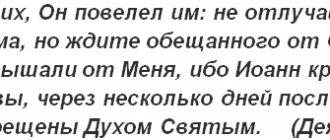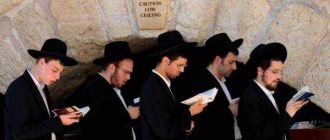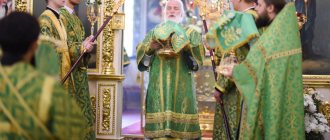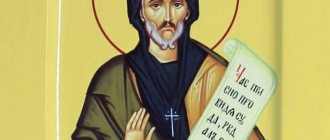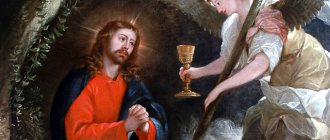The Lord's Prayer in Greek (Russian letters)
When the opportunity arises to move to another country, it is better to first turn to the Lord, reading foreign prayer words, but in Russian letters. This helps to develop an understanding of pronunciation features. If you immediately try to pronounce foreign prayer words, obvious mistakes may occur. Because of this, turning to God is done with the wrong message. This will not shorten the distance between the person praying and God.
Pater imon o en tys uranis
Ayassito to onoma su
Elseto and Vasilya Su
Yenisito to felima su os en urano ke epi thousand yis
Ton Arton Imon ton epiusion dos imin simeron
Ke afes imin ta ofelimata imon os ke imis afiemen thousand ofiletes imon
Ke mi isenegis imas is pirasmon, alla rise imas apo tu poniru.
Oti su estin
And Vasily
Ke and Dynamis
Ke and doxa
Is tus eonas
Amine.
Send this prayer to your loved ones
From the prayers of the daily circle
Midnight Office
The Midnight Office is celebrated in the middle of the night or early in the morning before sunrise.
Rising from sleep, wash your face, stand in front of the icon and, making the sign of the cross, say:
In the name of the Father and the Son and the Holy Spirit. Amen.
Then make three prostrations with prayers:
God, be merciful to me, a sinner. (Bow)
Thou who created me, Lord, have mercy on me. (Bow)
Without number of sins, Lord, forgive me. (Bow)
Then stand silently for a while until all your senses are calm and your thoughts are focused, and then begin:
Lord Jesus Christ, Son of God, pray for the sake of Your Most Pure Mother and all the saints, have mercy on us.
Amen.
Glory to Thee, our God, glory to Thee.
Prayer to the Holy Spirit
Heavenly King, Comforter[1], Soul of truth, Who is everywhere and fulfills everything, Treasure of good things and Giver of life, come and dwell in us, and cleanse us from all filthiness, and save, O Good One, ours ours.
Prayers to the Holy Trinity
Holy God, Holy Mighty, Holy Immortal, have mercy on us. (Thrice)
Glory to the Father and the Son and the Holy Spirit, now and ever and unto ages of ages. Amen.
Most Holy Trinity, have mercy on us; Lord, cleanse our sins[2]; Master, forgive our iniquities; Holy One, visit and heal our infirmities, for Thy name's sake.
Lord have mercy. (Thrice)
Glory to the Father and the Son and the Holy Spirit, now and ever and unto ages of ages. Amen.
Lord's Prayer
Our Father, who art in Heaven, hallowed be Your name, Your kingdom come, Your will be done, as it is in Heaven and on earth[3]. Give us this day our daily bread; and forgive us our debts, just as we forgive our debtors; and do not lead us into temptation, but deliver us from the evil one. For Yours is the kingdom[4] and the power and the glory forever. Amen. (Matt. 6:9-13)
Lord have mercy. (12 times)
Glory to the Father and the Son and the Holy Spirit, now and ever and unto ages of ages. Amen.
Come, let us worship the King our God. (Bow)
Come, let us worship and fall down before Christ, our King God. (Bow)
Come, let us bow and fall down to Christ Himself, the King and our God. (Bow)
Psalm 120
I have lifted up my eyes to the mountains, from where my help will come. My help comes from the Lord, who created heaven and earth. Do not let your feet fall into confusion; the One who guards you will fall asleep; behold, the One who protects you will not sleep; the One who protects Israel will fall asleep. The Lord will protect you, the Lord will cover your hand on your right hand. During the days the sun will not burn you; the moon will not burn you at night. The Lord will preserve you from all evil, the Lord will preserve your soul. The Lord will preserve your coming in and your going out from now on and forever.
Psalm 133
Behold, now bless the Lord, all you servants of the Lord, who stand in the temple of the Lord, in the courts of the house of our God. In the night, lift up your hands in holiness[5], and bless the Lord. The Lord from Zion, who created heaven and earth, will bless you.
Symbol of faith
1st Ecumenical Council (Nicaea, 325)
I believe in one God, the Father Almighty, Creator of Heaven and earth, visible to all and invisible. And in one Lord Jesus Christ, the Son of God, the only begotten, who was born of the Father before all ages. Light from Light, true God from true God, begotten, uncreated, consubstantial with the Father, to whom all things were. For our sake, man and our salvation came down from Heaven and became incarnate from the Holy Spirit and the Virgin Mary, and became human. Crucified for us under Pontius Pilate, and suffered and was buried. And he rose again on the third day according to the Scriptures. And ascended into Heaven, and sits at the right hand of the Father. And again the one who is to come will judge with glory the living and the dead, His kingdom will have no end.
2nd Ecumenical Council (Constantinople, 381)
And in the Holy Spirit, the Lord, the Life-Giving One, who proceeds from the Father, who is with the Father and the Son, we are worshiped and glorified, who spoke the prophets. Into one Holy, Catholic and Apostolic Church. I confess one baptism for the remission of sins. I hope for the resurrection of the dead and the life of the next century. Amen.
# Here you can add the 17th or any other kathisma from the Psalter, read according to your own schedule. On the days of the celebration of the Dormition of the Blessed Virgin Mary, at this place you can read the Praises from the Rite of Burial (see page 327)
Midnight troparia, tone 8
Behold, the Bridegroom comes at midnight, and blessed is the servant who will find the watch; but he is not worthy of peace, but the one who rests will find him. Take care, my soul, that you are not burdened with sleep, lest you be given over to death, and shut yourself up from the Kingdom, but rise up, calling: Holy, Holy, Holy art thou, O God, through the Mother of God have mercy on us.
Glory
[6]: This is a terrible day, my soul, think about it, burn your light, illuminate your cabbage soup with oil: do not worry when a voice comes to you saying: Behold the Bridegroom! Take heed, my soul, that you do not slumber and remain outside the crowd, like the five virgins, but wait cheerfully, so that you may sprinkle Christ with venerable oil, and He will give you the palace of Divine glory.
And now, Mother of God:
An insurmountable wall for you, a confirmation of salvation, Virgin Mary, we pray: destroy the opposing councils, turn your people from sorrow to joy, protect your city, pray for peace, as you do. You, Mother of God, are our hope.
Lord have mercy. (40 times)
Prayer for every hour of the day
Who is worshiped and glorified at all times and at every hour in Heaven and on earth, O Christ God, long-suffering, abundantly merciful, abundantly gracious,
Who loves the righteous and who has mercy on sinners, Who calls all promises to salvation for the sake of future blessings, Himself, Lord, accept ours at the hour of this prayer and correct our life to Thy commandments, do Sanctify our body, cleanse our body, correct our thoughts, cleanse our thoughts and deliver protect us from all sorrow, evil and illness, protect us with Your holy Angels, so that by guarding and instructing them, we may reach the unity of faith and the mind of Your unapproachable glory, like a blessing You are forever and ever. Amen.
We magnify Thee, the most honorable Cherub and the most glorious without comparison, the Seraphim, without the incorruptibility of God the Word.
Glorious Ever-Virgin, Mother of Christ God, bring our prayer to Your Son and our God, may You save our souls.
Prayer of Saint Ioannikios
My hope is the Father, my refuge is the Son, my covering is the Holy Spirit; Holy Trinity, glory to Thee.
Glory to the Father and the Son and the Holy Spirit, now and ever and unto ages of ages. Amen.
Lord have mercy. (Thrice)
General leave
Lord Jesus Christ, our God, prayers for the sake of Your Most Pure Mother, our reverend and God-bearing fathers and all the saints, have mercy on us, for you are good and lover of mankind.
Closing prayer of the Midnight Office, St. Basil the Great[7]
We bless you, O highest God and Lord of mercy, who always does with us great and unexplored, glorious and terrible, the number of which is innumerable, giving us sleep for the repose of our weakness and weakening of labor in laborious flesh. We thank Thee, for Thou didst not destroy us with our iniquities, but Thou didst love mankind as usual, and in desperation, Thou didst raise us up to glorify Thy power. Moreover, we pray for Your immeasurable goodness: enlighten our thoughts, clear our minds, and raise our minds from the heavy sleep of laziness, open our lips, and fulfill Your praise, so that we can unshakably Let us sing and confess to You, in all and from all, glorified God, the Beginning To the Father with Your Only Begotten Son and Your All-Holy and Good and Life-giving Spirit, now and ever and unto the ages of ages. Amen.
# On Saturday or - if necessary - on any other day, the commemoration of the dead is added:
Troparion for the Dead, Tone 8
Remember, Lord, that Thy servants are good, and if you have sinned in life, forgive: no one is sinless, only You are able to give peace to the departed.
With the depth of wisdom, build everything humanely, and give what is useful to everyone, the only Creator, rest, O Lord, for the souls of Your servant: for I have placed my trust in You, the Creator and Maker and our God.
Glory, voice 6
: With the saints rest, O Christ, the souls of Thy servant, where there is no sickness, no sorrow, no sighing, but endless life.
And now, Mother of God:
We bless you all, O Virgin Mother of God, for the inconceivable Christ our God is pleased to be contained in you. Blessed are we too, who have Your representation: day and night you pray for us, and the sceptres of the kingdom are established by Your prayers. Thus we cry out to You: Rejoice, O Gracious One, the Lord is with You.
Rest, Lord, Thy servants. (12 times, with bows)
Download “Our Father” in Greek to your phone and print
The site presents different versions: for Android, iOS platforms. This allows you to download the appropriate version of turning to Jesus. If you save it in your smartphone, you can turn to God always and everywhere, without searching for prayer words. It is also possible to print the appeal in the most common format - A4. This is a necessary measure when studying the text. In the future it will be possible to read the text online.
Send this prayer to your loved ones
Send this prayer to your loved ones
How to use the collection
Composite nature of sequences
One of the main principles of the collection is that unchangeable daily prayers are complemented by changeable weekly or holiday chants. Moreover, the maximum variety of prayer texts, depending on the day of the week or holiday period, occurs during Vespers and Matins.
Special sequences (for Holy Communion, for the sick and the deceased), at the request of the praying person, can be performed separately or as part of daily sequences: each element is in its place (for detailed instructions, see the notes at the beginning of the sequences).
If desired, you can supplement the following with the reading of the Psalter, Old and New Testament texts, as well as canons, akathists and prayers from the usual rules - for whom what is closer and more effective. The places indicated in the sequences for these readings do not mean that the addition is mandatory, it is only possible.
The edition you are holding in your hands offers an approximate selection of texts from the Octoechos, Menaion and Triodion. Anyone who has these books in their library can, using the method we propose, independently diversify their home prayer rule.
Sequence time
The main thing is not the order or the number of sequences read per day, but the correspondence of the sequence to the time of day. In this way, the original goal will be achieved - to sanctify every hour of the day and night with prayer.
Thus, the Midnight Office should be performed in the middle of the night or in the morning, if it is not yet dawn. Matins - begin shortly before dawn or immediately after it, so that the words “Glory to Thee, who showed us the light” accompany the sunrise. The evening song “Quiet Light” (i.e., dim) should occur at sunset, when it gets dark outside and lamps are lit in the houses. Compline, in the meaning of the word itself, is read after supper. The time of the remaining hours can be determined in connection with breakfast and lunch: the first hour is before breakfast, the third is between breakfast and lunch, the sixth is before lunch, the ninth is between lunch and the beginning of evening twilight (at different times of the year, the intervals between sequences will vary).
The third, sixth and ninth hours have special dedications that connect them with the New Testament events of the Crucifixion of the Lord (sixth hour), the Death of the Savior on the Cross (ninth) and the Descent of the Holy Spirit on the Apostles (third). On holidays, the troparia of the hours devoted to these topics may be replaced by holiday texts.
Dedications of the days of the week
Each day of the week has its own thematic theme. Since according to the biblical calculation of time, the day begins in the evening (note, as it is said in the Bible \ And there will be evening and there will be morning - the day is one
(Gen. 1:5), then the dedications of the days of the week begin at Vespers and last throughout the day until the ninth hour:
– Sunday evening and Monday afternoon are dedicated to the theme of repentance and the holy Heavenly Powers;
– Monday evening and Tuesday afternoon – also on the theme of repentance and St. John the Baptist;
– Tuesday evening and Wednesday day – to the Cross of the Lord (in memory of the betrayal of Judas) and to the Mother of God;
– Wednesday evening and Thursday afternoon – to the holy apostles and St. Nicholas the Wonderworker;
– Thursday evening and Friday afternoon – the Crucifixion of the Lord and the Virgin Mary;
- Friday evening and Saturday day - to all holy martyrs, saints and saints, as well as the commemoration of the dead;
– a series of dedications culminates in the weekly remembrance of the Resurrection of Christ, which begins at Vespers on Saturday and lasts throughout Sunday.
For the purpose of some relief, one dedication is left in the canons on Wednesday, Thursday and Friday mornings; both are preserved in stichera, troparia and exapostilaria.
Holiday periods of the year
During the church year, from September to August, holiday periods are fairly evenly distributed (the day of the holiday itself, the after-feast and the celebration of the holiday), dedicated to the main events of New Testament history from the Nativity of the Mother of God to Her Dormition. The Christmas cycle stands apart, including liturgical memories of the Annunciation of the Mother of God (April 7, 9 months before the Nativity of Christ), the Nativity itself (January 7, BC) and the Presentation of the Lord (February 15, BC, in the 40s). th day after Christmas). The cycle of fixed annual holidays is supplemented by the moving Easter cycle: the Entry of the Lord into Jerusalem, the Holy Resurrection of Christ - Easter, the Ascension of the Lord and Pentecost. The number of the twelve, that is, the 12 most important holidays of the year, also includes the commemoration of the Exaltation of the Holy Cross (326), marking the end of the era of persecution and the beginning of the era of the Christian empire.
This edition includes selected texts from the twelve feasts and Easter, intended for reading on the days of the holiday - in case it is impossible to be in church, but mainly during periods of after-feasts (they are indicated in a short introduction to each holiday). During the festive periods, which occupy a total of 117 days - just under a third of the year - the week's hymns are replaced by holiday ones. During Bright Easter Week (if desired, before Easter is celebrated), some sequences of the daily cycle are replaced by Easter hours.
“Our Father” in Greek listen online for free
Many people perceive information much better through sound vibrations than during reading. In addition, listening to the recording in audio format will help you remember it faster. This method is more suitable for children. You can also include a recording for people who cannot pray on their own. This option is suitable for people who have lost their legal capacity, patients after surgery, or with exacerbation of chronic diseases. Relatives can include a recording, which will help improve the person’s physical and mental condition.
Video version of the Lord's Prayer in Greek
Visualization is another way to quickly memorize the prayer text. At the same time, they simultaneously turn to the image of the Saint and pronounce words while watching the video sequence. It becomes possible to adjust the reading speed (pause when necessary). The video version is suitable for people who cannot pronounce words out loud: people with serious diagnoses, children. The changing images of icons are calming. Often, when you open such a file, pleasant music plays.
From the compiler
The Apostle's Commandment: Pray without ceasing
(1 Thess. 5:17) - the ideal of monastic work - is difficult to realize in the life of a simple person, filled with daily and hourly worries about his daily bread, about loved ones, about earthly prosperity. Based on this, the Holy Church in different historical periods offered different ways of filling the day with prayer. In one of the most important centers of liturgical creativity - Jerusalem - rites were formed that consecrated all the milestones of the daily cycle: in the middle of the night - Midnight Office, at sunrise - Matins, before going to work - the first hour, at the height of the working day - the third hour, at noon before lunch - sixth hour, at the beginning of the evening - ninth hour, at sunset - vespers, after dinner (supper) - compline; all these sequences were included in the Book of Hours - a book that is still used in church services. Such an intensive order of services, intended for Palestinian monasteries, was beyond the power of ordinary parishioners - people simply could not gather in the temple 8 times a day, taking time off from everyday affairs. Over time, a more convenient order for the people of parish worship was developed: in the church only Vespers with the ninth hour before it is served, Matins in conjunction with the first hour, and the third and sixth hours, performed immediately before the Liturgy, if there is one. And the Midnight Office and Compline, which formed the basis of the morning and evening prayer rules familiar to us, are offered for execution at home, “in private.” As a result of these changes, sadly, the connection between the rites and the time of day was lost, both in church and in home worship: in church Matins is often served in the evening, Vespers in the early morning (for example, during Lent), and reading at home The morning rule, containing midnight troparia, can be delayed until almost noon.
Today, the daily prayer work of the laity is limited to morning and evening rules. Repeated from time to time, due to the weakness of human nature, they gradually lose their impact on the soul, leaving the mind and heart unaffected by the warmth of prayer. While the rules of daily worship, in addition to variety in time, offer us different content of prayers depending on the day of the week and year - in the Church, each day of the week has its own dedication, and periods of holidays and fasts are distributed throughout the annual circle. Thus, a great variety of sublime and poetic prayer texts from various authors, collected over the centuries into liturgical books called Octoechos, Menaea and Triodion, remains unknown to the average parishioner. The proposed prayer collection is intended to at least partially fill this gap and provide an opportunity for an Orthodox Christian, relying on the liturgical structure of the Church, to consecrate with special prayer any time of the day, every day of the week and all holiday periods of the year.
The collection is based on the unchangeable sequences of the daily cycle, taken from the Book of Hours - they form the first section of the book. By analogy with liturgical practice, these sequences can be supplemented by variable texts of the seventh (i.e., weekly) and annual circle (second and third sections). For this purpose, a first-of-its-kind selection of the most expressive texts from the Octoechos, Menaion and Triodion was prepared.
Our collection remains open regarding the practice of home reading of the Holy Scriptures and various cell prayers: the sequences indicate the most suitable places for reading the Psalter, Old Testament, Apostolic and Gospel readings, canons, akathists and prayers of the choice of the worshiper.
The publication also includes a section containing supplemented sermons for Holy Communion and after it, sermons about the sick, about the deceased, about Orthodox rulers (two psalms from the Book of Hours) and a daily commemoration. Most of the prayers in this section are borrowed from the old printed Canon and introduce the reader to the rich ancient Russian prayer tradition.
The sequences of the daily circle are adapted for performance by the laity: all prayers that involve the participation of a priest and choir are omitted. For ease of home use, the verse cycles for Vespers and Matins are suggested to be read after the corresponding psalms.
The compilers tried in every possible way to avoid repetitions both within the sequences and throughout the book. In particular, the Lord’s Prayer “Our Father” (Matthew 6: 9-13) - central in all respects - is given once in each of the sequences, and the reader will encounter Psalm 50 once in the third hour (as a prophetic one about the gift of Holy Spirit and underlying the troparion of this hour) and once in Compline (as most appropriate to the repentant mood at the end of the day).
When compiling the collection and when choosing the method of presenting the material, we took into account the very diverse prayer books used in the Greek-speaking Local Orthodox Churches - and this is a good half of the Orthodox world - and the liturgical books of the Russian Orthodox Church: Book of Hours, Great Book of Hours, Canon, Followed Psalter. Several little-known sequences and texts were borrowed from Russian church early printed publications with the necessary adaptation of their archaic language to the Church Slavonic norms accepted today.
This prayer collection represents only one of many ways to perform daily prayer. The proposed order of rites is in no way intended to replace participation in public worship, especially on Sundays and holidays. At the same time, the prayer book is compiled in such a way that it can be used both privately - at home, on the road, at the place of work, and in a prayer meeting of believers in a temple, chapel or prayer room - in the absence of a priest.
Latin transcription
This method of learning helps to avoid mistakes when pronouncing words. It is used at the stage of familiarization with an unfamiliar language. First, you can master the version written in Russian letters. After this, you can read the Latin transcription.
| In Russian | Latin transcription |
| Pater imon o en tys uranis Ayassito to onoma su Elseto and Vasilya su Yenisito to felima su os en urano ke epi tys yis Ton Arton Imon ton epiusion dos imin simeron Ke a ́fes imin ta ofelimata imon os ke imis afieman thousand filates imon ke mi isenegis imas is pirazmon, alla rise imas apo tu poniru. Oti su estin I vasilya Ke and dynamis Ke and doxa Is tus eonas Amin. | Páter imón o en tis uranís Ayassíto to ónomá su Elséto i vasilía su Yenisíto to félimá su os en uranó ke epí tis yís Ton árton imón ton epiúsion dos imín símeron Ke áfes imín ta of elímata imón os ke imís afíemen tis ofilétes imón Ke mí isenégis imás is pirazmón, allá ríse imás apó tu ponirú. Óti sú estin I vasilía Ke i dinamis Ke i dóksa Is tus eónas Amín. |
